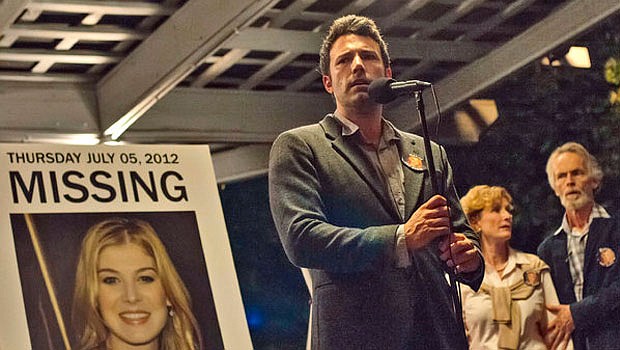- November 25, 2024
-
-
Loading

Loading

The traditional marriage vow of, “…for better or for worse,” and all its implications have been expanded to their psychological precipice in director David Fincher’s new adrenaline-induced frenzy of a film, "Gone Girl."
Adapted from the best-selling novel of the same name by Gillian Flynn, the plot concerns the disintegrating marriage of Nick Dunne (portrayed by Ben Affleck) and Amy Dunne (played by a sensational Rosamund Pike). But before the Dunnes can settle their differences and reinvigorate their stale marriage, Nick discovers his front door open, his living room a strewn with a broken glass table and his wife gone.
Like most great thrillers, there's a plot twist too enjoyable and dumbfounding to be revealed here. But the ensemble that guides the audience through this maze of marital betrayal, violence and ambiguity are as skilled and taut as the film itself. Affleck is at his most understated and natural as the whole world seems to crash around him, and further revelations lower any amount of sympathy. Pike, though technically missing, dominates this film with an intensity and a flourish that will cement her career and hopefully provide equally complex roles in the future.
The supporting players are equally astounding in their subtlety and ability to break out of stereotypical, melodramatic stock characters that are all too common in cinematic and television murder procedurals. Margo Dunne (played by Carrie Coon) provides a moral compass for her twin brother Nick’s dilemma, and Coon offers much need honesty and humor throughout the gripping game of unfolding lies and deception. The lead detective on the case, Rhonda Boney (played by Kim Dickens), also provides a human portrayal of a police officer, who is surrounded by dozens of cops who assume Nick is guilty. Entertainment mogul Tyler Perry offers a fast-paced and smooth portrayal of Tanner Bolt, Nick’s high-profile defense attorney. And Neil Patrick Harris offers a distant departure from his lovable lothario, Barney Stinson, in "How I Met Your Mother" as Amy’s clingy, creepy wealthy ex-boyfriend, Desi Collings.
The film alternates between Nick’s perspective, who vehemently denies any involvement with his wife’s disappearance, and Amy’s perspective, which is presented through voice-over depictions of diary entries that provide a tour into their almost magical courtship to their abrupt disintegration brought upon by family illness and economic recession.
With each subsequent scene from Amy’s diary, Fincher increases the velocity of Nick’s presumed guilt. All that remains to convict him are what little could possibly remain of Amy’s body. However, Flynn’s screenplay combined with Fincher and longtime cinematographer Jeff Cronenweth’s cool valley of decay defy any concept of a simple solution to the investigation, and the film projects a world that is saturated with media poisoning, the power of the lens and pliable minds that can be easily manipulated.
The noir films produced from the early 1920s to the mid 1950s represented the anxiety of Depression, global war and living in the nuclear age. "Gone Girl" represents a new brand of tension that Fincher has explored previously in "The Girl with the Dragon Tattoo" and "The Social Network." That tension is the paradox of the multimedia-internet age: the closer one looks at something, the less one really understands or knows. And what remains after the veil is removed can be equally amazing and horrendous. A definite example of the best cinema has to offer as it reflects the worst of society’s demons.